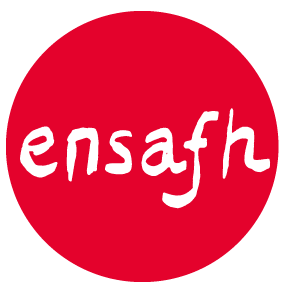
“Islands are the focus of people’s imaginations, we think of them as an idealized paradise or places where people get trapped or stranded.”
Elaine Ewart (berne yn 1975 yn Lincoln, Ingelân) hold op tongersdei 7 septimber op de Fryske Akademy in lêzing mei de titel Voices from Heligoland: literary representations of the North Sea. Foar har ôfstudearskripsje foar de stúdzje kreatyf skriuwen, dy’t se folget oan de universiteit fan Essex, bestudearret se de relaasje tusken ekology, lânskip, taal en literatuer op it eilân Helgolân en yn it Fryske kustgebiet troch de tiid hinne. Elaine skriuwt proaza en poëzij en wûn yn 2012 de Fenland Poet Laureate. Yn har skriuwen spilet it lânskip yn har omjouwing, de feanen, in grutte rol. Famyljerelaasjes binne ek in wichtich tema. Yn har wenplak Ely en omkriten organisearret se geregeld lêzings en wurksjops oer literatuer.
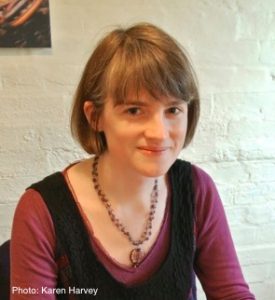
Foto: Karen Harvey
The fens in your environment are an important subject in your poetry. What’s the landscape like where you live?
Elaine: ‘I was born in Lincoln, which is in the Midlands. It’s just south of the river Humber. I grew up in a very flat landscape, although there are bits of Lincolnshire which are hilly. Lincoln itself is on hill. Later on I went to university in Oxford and after that I moved to East Anglia. I’ve lived in various towns in the east of England and those places have all been quite flat. I now live in Ely, which is in the fens. Ely itself is on a hill and it has a great cathedral, which is known as the Ship of the Fens. But the land around it is reclaimed land. It was drained, in fact, by a Dutch engineer called Cornelius Vermuyden. So I feel it has a lot of similarities with Friesland. And of course there were a lot of issues in the past with people who didn’t want the land to be drained and the people who would benefit from having the land drained and farming it.’
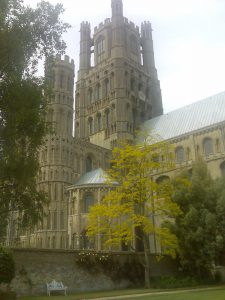
Have you been in Fryslân before?
‘I haven’t. This is my first visit here. I knew how the landscape looks like from reading about it. But I think really until you actually go and see a landscape it is hard to appreciate it. I’ve been on a field trip for my PhD project, which is a creative writing project about Heligoland and the North Sea Frisian coast. I’m looking at that area as a bioregion, that is, a region that is connected because of its geography and to some extent its language and culture, in a way which transcends national boundaries. I went to the island of Terschelling and then to the German islands of Norderney and Heligoland, and after that I came back to Leeuwarden. I was just talking to people and getting a feel for the place and what the environment is like. Heligoland is very rocky and very different from the Frisian islands, which are much lower and sandier.’
How do you like Ljouwert en Fryslân so far?
‘I think it’s lovely. I really like this city. There’s quite a buzz when you walk around, yet it’s small. It seems to be quite international as well. When you walk down the streets you see different restaurants, with cuisine from different countries. It seems as though it’s quite a laidback culture. I was in the Frisian Academy yesterday; I went out to lunch and when I came back they were all playing volleyball. I’ve never worked anywhere where people would just go out of their office to play a sport match together. I thought it was a great idea. And I enjoyed being by the sea as well and being up to the islands. Yesterday I went to the Frisian Museum and I loved that. When you go in you have all the different artifacts telling you about Frisian culture and history. I thought they were really well chosen and quite moving. For instance, there is a tobacco box which is engraved with Frisian cows. The information plate said that in the time of the cattle plague every farmer planted a tree for every cow that died. I thought that was a very moving tribute. It reminded me of some of the farming crises in the UK, like the foot and mouth epidemic and the BSE crisis, when thousands of cattle had to be culled and there were huge piles of these bodies burning. I can remember what kind of effect that had in the rural areas where I’ve always lived.’
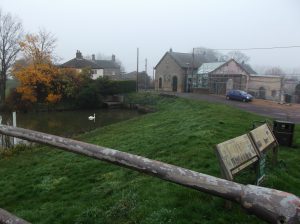
What are you going to do tomorrow?
‘Tomorrow I’m going to Groningen to visit Professor Goffe Jensma, to hopefully find out a bit more about Frisian literature. I met him briefly yesterday at a lecture at Tresoar. This is the start of the term and there were many students who started studying multilingualism. They had a guest speaker, Mari Jones from the University of Cambridge, talking about minority languages. It was marvellous to see so many students there. The room was full.’
Why did you choose Heligoland as the subject of your lecture at the Fryske Akademy?
‘Well, I was originally interested in islands. They are the focus of people’s imaginations, we think of them as an idealized paradise or places where people get trapped or stranded. And as places where people connect, particularly in the past, when we travelled more by sea. And with Heligoland I was interested in its history and the connections with Great Britain. Of course, it did once belong to Great Britain and later it was handed over to Germany. Heligoland has reflected the interconnectedness between both countries, at different times being friendly or antagonistic. And I’m interested in the way it has been rebuilt after it was destroyed so completely by British bombing and explosions. I’m also interested in wildlife, so I’m interested in Heligoland as an important location for bird life, the seabirds which nest there, and the birds which descend on Heligoland during their spring and autumn migrations, on their way across the North Sea.
Before I started my PhD I did an MA thesis which is also about Heligoland, but it’s a smaller project. It was based on Heligoland as the focus for migration, connection and also destruction and violence, and how I bring those things together. So I’m using some examples of that in my lecture. For instance, W.G. Sebald, a German writer who emigrated to Britain, wrote the book The Rings of Saturn, about walking along the Suffolk coast and reflecting on the 20th century history of war and violence. He explores these themes using various metaphors related to the natural world, such as the silkworm and the herring, which are woven throughout this work. What I wrote about the journey that I made to Heligoland to do my MA project is in a way parallel to Sebald’s work, because I’m British, going to a German location which the British destroyed, and reflecting on that.
The island has been a focus for literature and science in the 19th century for the German Romantics, like the poet Heinrich Heine, who visited the island and were inspired by the sea, and the majestic rock. I’m going to read some of my creative piece which concentrates on Heinrich Heine’s reflections on the political situation at the time, and his religious thoughts. He wrote ‘Letters from Heligoland’ (a chapter in his book, Ludwig Börne) in which he describes the experience of hearing about the July revolution of 1831, when he’s staying on Heligoland. It’s against this backdrop of this national monument and he sees the situation reflected in the environment around him. Elsewhere, in his North Sea essay, Heine idealizes the Frisian islanders on the island of Norderney, and their simple fishing community. A very hard life, but uncorrupted by what he sees as the money making commercial and capitalist centres. And I’m hoping to also look at the parallel Frisian Romantic movement. I haven’t researched that aspect yet, but at least I can say in the lecture what my plan is.
I discovered that the Frisian language which is spoken on Heligoland is completely different from West Frisian. It’s very nice to hear Frisian spoken here, because on Heligoland there aren’t many people who speak it [Halunder] anymore, although they teach the language to the children in school. The subject is optional and with so many people coming to the island it’s quite a challenge to maintain the language.
So I’m trying to tie these different aspects together in my lecture.’

What do you study?
‘I study creative writing at the University of Essex. What I’m doing for my PhD is like this: my thesis is in two parts. I write a creative piece and then I do critical commentary on that. So what I’m writing is describing my journey around these places and reading other writers who’ve written about it and how they responded to this area. So it’s part nature writing, part travel writing and part memoir. Really what I’m hoping to do is by drawing connections between the places that I know, East Anglia and Friesland, to look at it in a different manner, to hopefully find a way of building bridges.
I hope to finish my thesis next October, so I intend to knuckle down and do a lot of writing. I’m going back to the UK in the weekend. I’ve had eight weeks of travel, so it will seem strange to be back.’
Were you invited by the Fryske Akademy?
‘Well, I approached them. One of my supervisors, Chris McCully, who is a poet, used to work at the Frisian Academy. And I also thought it would be a good place to visit to find out more about the connections between the Frisian language and culture. Because I feel that, so far, the things that I’ve been reading have either been in English or in German and it’s slightly harder I suppose for me to explore the Frisian side of things. So they welcomed me for the week and I offered to speak and now I’m giving a talk on Thursday and I’m looking forward to that.’
In your country you organize readings and workshops about literature. Are you with an organization?
‘It started in 2012, when I won a competition to become The Fenland Poet Laureate. This competition was run by a local arts organization. From that, I started getting involved in writing poems for local events and running workshops and making contact with all the other poets in the area. And over the years successive Poet Laureates have also taken over the title. We didn’t form an organization, because it’s not formal, but a collaboration called the Fen Speak Poetry Collective. We organize a regular open mic night, where anyone can come to read from their work, and creative writing workshops in the local area. They’ve been held in museums, on nature reserves, in schools and in local libraries, and that’s been a really rewarding field of work. Some of my fellow poets set up a literary magazine called The Fenland Reed. So it keeps starting other projects, which is really nice.’
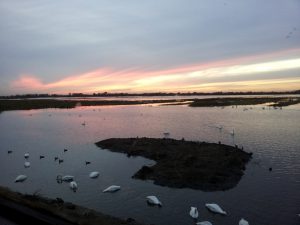
In 2014 you published a poetry pamphlet, Fur, feather and fen. What can you tell about that?
‘That was my first poetry book. I actually self published it. It contains the poems that came out of my year of Fenland Poet Laureate. So, things that were inspired by the Fenland area, its history and its people. I did a small print run of it and it seemed to work well. That was three years ago. I haven’t published another collection of poems since then. Because since I took on the PhD, my poetry has become a bit more sporadic. I do one every so often. It’s hard for me to put them all together really.’
When did you start writing?
‘I’ve always written creatively when I was younger. I used to write stories when I was a child and decorated them with pictures. At a certain age I stopped for a while, I think I wasn’t quite sure what I wanted to do with it or what I wanted to say. When I graduated I went into the law. I worked as a solicitor for seven years. The work took a lot of my energy and I felt that nothing was really happening with my creative side. So, in the end I gave it up and concentrated on writing and my study. I started writing poetry about eight years ago. I did a short course with the Open University in the UK, which does distance learning courses. And since then I carried on.’
